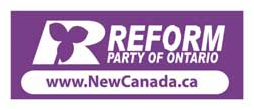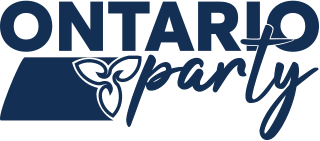Related Research Articles
The Christian Union is a Christian-democratic political party in the Netherlands. The CU is a centrist party, maintaining more progressive stances on economic, immigration and environmental issues while holding more socially conservative positions on issues such as abortion and euthanasia. The party describes itself as "social Christian".

Ernest Preston Manning is a Canadian retired politician. He was the founder and the only leader of the Reform Party of Canada, a Canadian federal political party that evolved into the Canadian Alliance in 2000 which in turn merged with the Progressive Conservative Party to form today's Conservative Party of Canada in 2003. Manning represented the federal constituency of Calgary Southwest in the Canadian House of Commons from 1993 until his retirement in 2002. He served as leader of the Official Opposition from 1997 to 2000.
The Green Party of Ontario is a political party in Ontario, Canada. The party is led by Mike Schreiner. In 2018, Schreiner was elected as the party's first member of the Ontario Legislative Assembly. In the past, the party did see significant gains in the 2007 provincial election, earning 8% of the popular vote with some candidates placing second and third in their ridings. A milestone was reached in the 2018 provincial election, when Schreiner was elected to the Legislative Assembly of Ontario in the riding of Guelph.
The Conservative Party of Canada, colloquially known as the Tories, is a federal political party in Canada. It was formed in 2003 by the merger of the two main right-leaning parties, the Progressive Conservative Party and the Canadian Alliance, the latter being the successor of the Western Canadian–based Reform Party. The party sits at the centre-right to the right of the Canadian political spectrum, with their federal rival, the Liberal Party of Canada, positioned to their left. The Conservatives are defined as a "big tent" party, practising "brokerage politics" and welcoming a broad variety of members, including "Red Tories" and "Blue Tories".

The Ontario Liberal Party is a political party in the province of Ontario, Canada. The party has been led by interim leader John Fraser since August 2022.
The phrase Common Sense Revolution (CSR) has been used as a political slogan to describe conservative platforms with a main goal of reducing taxes while balancing the budget by reducing the size and role of government. It has been used in places such as Australia and Canada. This article deals with the "Common Sense Revolution" as it was under Ontario Premier Mike Harris and the Progressive Conservative Party of Ontario from 1995 to 2002.
A Red Tory is an adherent of a centre-right or paternalistic-conservative political philosophy derived from the Tory tradition; it is most predominant in Canada, but also has a presence in the United Kingdom. This philosophy tends to favour communitarian social policies, while maintaining a degree of fiscal discipline and a respect of social and political order. It is contrasted with "Blue Tory" or "High Tory". Some Red Tories view themselves as small-c conservatives.

The Christian Heritage Party of Canada, also referred to as CHP Canada, is a minor social conservative and Christian right federal political party in Canada; it was founded in 1987, the brainchild of two couples in British Columbia, namely Bill and Heather Stilwell who were Roman Catholics and Ed Vanwoudenberg and his wife, Reformed Protestants. CHP advocates for Canada to be governed according to Christian principles and ethics. The party's stated principle is that "the purpose of civil government is to ensure security, freedom, and justice for all its citizens from conception till natural death, by upholding just laws". CHP states that, if the party forms government, it hopes to "apply proven Judeo-Christian principles of justice and compassion to Canada's contemporary public policy needs".
The New Reform Party of Ontario was a minor provincial political party in Ontario, Canada, that promoted a populist, fiscally conservative, socially conservative, libertarian, and localist ideology.

The Reform Party of Ontario (RPO) (PRO; French: Parti Réformiste de l'Ontario) was a minor political party in Ontario, Canada. Until the 1999 provincial election, the party ran one candidate each election in order to keep the party's name in the possession of supporters of the Reform Party of Canada.

The Ontario Provincial Confederation of Regions Party is a minor political party in Ontario, Canada, the provincial branch of the now-defunct Confederation of Regions Party of Canada. The party was founded in 1989, around the time the federal CoR was dissolved, and remains the last Confederation of Regions Party in Canada.
Liberalism has been a major trend in Canadian politics since the late 18th century. Canada has the same features of other liberal democracies in the Western democratic political tradition. This article gives an overview of liberalism in Canada. It includes a brief history of liberal parties with substantial representation in parliament. Canadian liberalism is different from the American use of the term, as it contains ideas such as support for economic liberalism.
Canada holds elections for legislatures or governments in several jurisdictions: for the federal (national) government, provincial and territorial governments, and municipal governments. Elections are also held for self-governing First Nations and for many other public and private organizations including corporations and trade unions. Municipal elections can also be held for both upper-tier and lower-tier governments.

The Israel Democracy Institute, established in 1991, is an independent center of research and action dedicated to strengthening the foundations of Israeli democracy. It is located in Jerusalem, Israel.
The New Democratic Party is a federal political party in Canada. Widely described as social democratic, the party occupies the left, to centre-left on the political spectrum, sitting to the left of the Liberal Party. The party was founded in 1961 by the Co-operative Commonwealth Federation (CCF) and the Canadian Labour Congress (CLC).
The Pauper Party of Ontario is a former libertarian-populist political party in the Canadian province of Ontario based on the principles of social credit. Registered in 2011, the party was led by perennial candidate John Turmel.
In politics, a lead candidate is the leader of a political party in an election to a legislative body. In parliamentary systems, it is often the party's nominee for the position of head of government. In open list electoral systems, it is the first candidate on a party's electoral list. The lead candidate can be, but is not necessarily, the party chair or political leader.

The Ontario Alliance is a minor social conservative and right-wing populist political party in the Canadian province of Ontario. Founded in November 2017 by Jay Tysick, the party was led during the 2018 Ontario provincial election by William Cook.

The Ontario Party is a former minor social conservative, economic liberal and right-wing populist political party in the Canadian province of Ontario, founded in 2018.

The New Blue Party of Ontario is a minor socially conservative political party in the Canadian province of Ontario. Founded in 2020, the party is led by Jim Karahalios, the husband of Belinda Karahalios, the party's first MPP.
References
- 1 2 "Registered Political Parties in Ontario". www.elections.on.ca. Elections Ontario. Archived from the original on 2018-11-26. Retrieved 2018-05-23.
- ↑ "Party Governance". Consensus Ontario. Archived from the original on 22 May 2018. Retrieved 22 May 2018.
- ↑ Hillman-Rapley, Lynda. "Strathroy man behind new political party". Sarnia Observer. Postmedia. Retrieved 23 May 2018.
- ↑ "Registered Political Parties". Elections Ontario . Retrieved 23 July 2023.
- ↑ "Our 2018 Election Platform". Consensus Ontario. Archived from the original on 22 May 2018. Retrieved 22 May 2018.
- ↑ Brown, Dan (19 May 2018). "Consensus Ontario wants to end party politics for good". The London Free Press. Retrieved 23 May 2018.
- ↑ Nixon, Scott (22 March 2017). "Area publisher launches new political party". Exeter Times-Advocate. Retrieved 23 May 2018.
- ↑ "How Consensus Government Would Work". Consensus Ontario. Retrieved 22 May 2018.
- 1 2 "Our Principles". Consensus Ontario. Retrieved 22 May 2018.
- ↑ "Policy Discussions". Consensus Ontario. Retrieved 22 May 2018.
- 1 2 3 "Summary of Valid Votes Cast for Each Candidate" (PDF). Elections Ontario. Archived from the original (PDF) on 28 December 2018. Retrieved 27 February 2019.